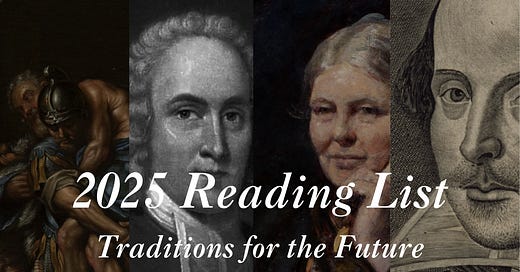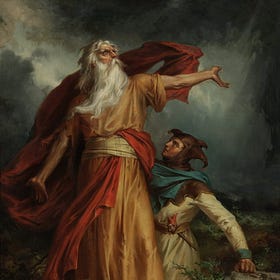If you have been subscribed from the beginning of this year onward, you should receive The Traditions for the Future Reading List in your inbox for you to download. In it are book recommendations that I give to better equip you in the purpose of this publication.
Because we are nearing the end of the year, I thought it would be best to put that list here as well as some valuable additions.
The Bible
The Holy Scriptures, inspired by the Holy Spirit, must be read.
We must know what we are to believe concerning God and what duty God requires of us. This is where the Triune God is revealed to us and the manner in which we worship Him. It shows us how we may be reconciled to God through faith alone in Jesus Christ. As Westerners, we must read the Bible because all of our other books echo and reflect it. Take up and read.
The Iliad by Homer
This is a great starting point in Western literature.
Homer’s epic tells the tale of the fabled Trojan War. Achilles has his prizes taken away from him by his fellow Greeks. In his anger, he vows not to fight in the war any longer. Because of this the war falls into greater tragedy at the cost of good, honorable men. The events that transpire leads Achilles out of his tent to fight with unbridled rage.
To Kill a Mockingbird by Harper Lee
As an Alabamian, I must put this on the list.
In the summer of 1933, Scout and her older brother Jem along with Dill, the boy next door visiting for the season, learn of the scary man, Boo Radley, living in the dilapidated house. As the story unfolds, their father, the famed Atticus Finch defends a black man who is falsely accused of raping a poor white woman. The novel masterfully intertwines the two plots and is a Southern classic.
The Pilgrim’s Progress by John Bunyan
What could be said that hasn’t been said already?
Every Christian must read this book. It is an allegory following Christian’s journey to the Celestial City as he encounters the Slough of Despond, Vanity Fair, and Doubting Castle. Read it.
“Next to the Bible the book I value most is John Bunyan's Pilgrim's Progress. I believe I have read it through at least a hundred times. It is a volume of which I never seem to tire.”
- Charles Spurgeon
The Odyssey by Homer
In this epic sequel to The Iliad, Odysseus begins his trek home after being at war for 10 years. When he lands upon an island home to a one-eyed Cyclopes, he taunts and jeers at him, and even gouges out his eye. This infuriates his father, Poseidon, and incurs his wrath which begins the 10 year journey home for Odysseus. Our famed hero encounters lotus-eating nymphs, witches, Sirens, devilish sea monsters, and walks through Hell to get back home.
On the island of Ithaca, his home, men are trying to steal his wife, his riches, and kill his son. The man worthy of her must string the king’s bow and shoot the arrow through a test of rings. There is only one man who is able to do it.
As I Lay Dying by William Faulkner
I read this in college and did not appreciate it for what it is. I have reread it and was blown away by it. An unorthodox style of storytelling, but a powerful one nonetheless. The story follows the Bundren family as they travel to bury the matriarch in her home town. Chaos is the result of their collective and individual follies. It is truly a magnificent story and the final line will leave you in shock.
The Westminster Standards
A timeless resource and standard of Faith.
“From July 1643 to February 1649, over 120 Bible scholars and others met continuously in order to stop the heretical teaching that was infiltrating the church and draw up a statement of belief that could be adopted and taught throughout the church.” - blurb on the back of my edition.
“Man’s chief end is to glorify God, and to enjoy Him forever.”
The Aeneid by Virgil
“Tears are in the nature of things.”
Virgil, the Roman poet, follows the story of Aeneas after the fall of Troy as he is led to fulfill his destiny of establishing the Roman people. There is much of duty and honor in it. The epic is truly remarkable and is deservedly revered along with The Iliad and The Odyssey.
Jayber Crow by Wendell Berry
A faithful continuation in Wendell Berry’s fiction that is an autobiography of the barber of Port William. Heavily inspired by Far From the Madding Crowd by Thomas Hardy, Berry weaves in the Southern themes of community, place, and memory.
This book is not only a good introduction to Berry’s fiction but serves as a faithful guide into the Southern ethos. If you want an introduction to Thomas Jefferson, William Gilmore Simms, and William Faulkner, read Jayber Crow.
Jonathan Edwards: A New Biography by Iain Murray
This is the most influential book of my life outside of the Bible. To get an understanding of the hue of Traditions of the Future, read this book. The life of Jonathan Edwards fascinates me. He went to Yale at 13, become converted at 17, wrote his 70 Resolutions at 18 & 19, pastored a church for 25 years, was kicked out of that church, became a missionary to the Indians, and died as the President of Princeton. This gentle and joyful man is misunderstood by most. He must be known in our times.
King Lear by William Shakespeare
An old and aged king abdicates the throne and holds a contest to see which of his three daughters loves him the most. The reward will be the kingdom. The first two daughters have outlandish displays, but the third daughter concludes that if she loves her father she will not have to display it, he will know it. The foolish king banishes her and insanity ensues. In many ways it may be the greatest work written in English outside the King James Bible. It climaxes when the king stands in the middle of a storm, barking commands at it, and strips naked. I’m requiring you to read it.
A Way to Pray
O. Palmer Robertson, a Presbyterian missionary to Uganda who was once the director of the African Bible University, has made this wonderful edition of Matthew Henry’s Method of Prayer. This is the book I turn to when I pray. Matthew Henry encapsulates the different types of prayer: praise, confession, petition, thanksgiving, and intercession. The best part is that it is all Scripture. No fat. This is the best book on prayer, bar none.
O. Palmer Robertson writes Elder to Elder on Substack.
The Apology of Socrates by Plato
One of the most important books in the history of the West.
Plato recounts the trial and execution of his teacher, Socrates, as he is accused by the Athenian council of being an atheist and corrupting the youth of Athens. Socrates refutes both claims, and states that does not believe in the Greek gods because the oracle of Delphi declares him the wisest man in all of Greece. Socrates explains that he is not the wisest man because he sees in himself all the ways that he is not wise.
When you read this book you will see the beginnings of ideas that were later developed in the American Revolution.
Lee by Douglas Southall Freeman
This biography shows the military genius, integrity, and heart of one of the greatest generals in history. The biographer does not take the modern opinion of Lee and shows the reasoning behind his patriotism and true views on slavery.
The Virginian was godly man who loved the Lord Jesus and his home state. If you don’t know much about Robert E. Lee this is the book for you.
Thoughts for Young Men by J.C. Ryle
I have read this book every year since the elder that took me under his wings slid this across the table in the new members class. Ryle hits plainly and hard. This little book is not just for young men as my elder said. It is a book for any man. It gives seasoned, godly wisdom for holiness and piety. When you read it, you get the sense of the love the author has for the Lord Jesus and that he wants it for you as well. I recommend this must-read book to all men, especially young men.
The Home Education Series by Charlotte Mason
If there is one series that has struck me the most it is The Home Education Series by Charlotte Mason. I find it better to learn from a woman who was responsible for the education of tens of thousands of students in England than someone who has an opinion.
Her primary beliefs about education were that “children are born persons”, “education is the science of relations”, and “education is an atmosphere, a discipline, a life.” Her scope is not limited to the classroom but expands to the whole person.
Julius Caesar by William Shakespeare
There is a tide in the affairs of men
Which, taken at the flood, leads on to fortune;
Omitted, all the voyage of their life
Is bound in shallows and in miseries.
The classic tale of fate and tragedy, succumbed to the results of pride. The zealous, fiery Cassius coaxes the stable, noble Brutus into the plot of assassinating Julius Caesar. From this easy-to-read classic comes some of the most memorable and quotable lines of Shakespeare.
Othello by William Shakespeare
Considered by many to be the best work of Shakespeare, Othello is an all-time classic and a foundational text in the English language. The play is littered with double entendres as commonly used by the Satanic-like villain, Iago.
After being passed over for a promotion, as well as harboring that Othello has slept with his wife, Iago begins a spider-like weaving of schemes to which the English poet, Samuel Taylor Coleridge described it as, “The motive-hunting of motiveless Malignity”1
The Bruised Reed by Richard Sibbes
‘I shall never cease to be grateful to Richard Sibbes who was balm to my soul at a period in my life when I was overworked and badly overtired, and therefore subject in an unusual manner to the onslaughts of the devil . . . I found at that time that Richard Sibbes, who was known in London in the early seventeenth century as “The Heavenly Doctor Sibbes” was an unfailing remedy. The Bruised Reed . . . quieted, soothed, comforted, encouraged, and healed me.’
— D. Martyn Lloyd-Jones2
Written with such a pastoral care, The Bruised Reed is a balm to every hurting reader that opens its pages. I highly recommend this Puritan gem.




